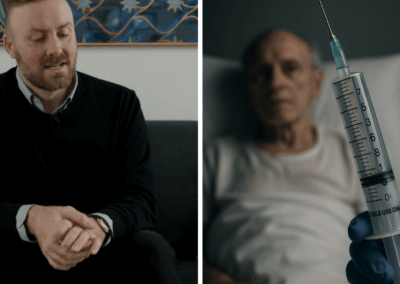A Canadian man who recorded hospital staff offering him assisted suicide, despite him being clear he did not wish to end his life, has urged Scotland not to follow Canada down the “dark path” of introducing assisted dying.
As MSPs prepare to debate and vote on Liam McArthur’s Assisted Dying for Terminally Ill Adults (Scotland) Bill next month, Roger Foley sent a message to Scotland, saying “You do not have to venture down the dark path Canada, and other nations, have followed. Indeed, you have the chance to show there are better ways of meeting dying people’s needs”.
In 2018, Foley, a Canadian man with a chronic neurological disease, recorded hospital staff offering him assistance in suicide despite him being clear that he wanted assistance to live at home and not to end his life. After telling a member of staff that he would be fine if he just had funding, the staff member said “But if you weren’t, you, just, you can just apply to get an assisted, if you want to end your life, like you know what I mean. You don’t have to do it in some dramatic manner, you can apply for assisted, you know…”.
Foley has been clear that he does not want to die. He told the New York Post “I’ve been pressured to do an assisted suicide”.
Calling on Scotland to “protect its vulnerable citizens”
He is now calling upon his experience to warn Scotland not to follow Canada, where legislation allowing euthanasia and assisted suicide was passed in 2016. However, in 2021, the Canadian Parliament repealed the requirement that the natural death of those applying for euthanasia or assisted suicide be “reasonably foreseeable”. Legislation was introduced in February 2024 so that euthanasia and assisted suicide would become legal on the grounds of mental health alone in March 2027.
Foley explained that “As Canada has expanded its assisted dying law, I have faced neglect, verbal abuse, and denial of essential care. I’ve been told my care needs are too much work, and my life has been devalued”.
“Worse still, I have been approached and told by healthcare staff to consider opting for Medical Aid in Dying (MAiD). Instead of offering compassionate support to alleviate my suffering, it is suggested to me that I should end my life. I find this deeply hurtful” he said.
“I believe my experience is a canary in the coal mine – a warning of the abuses that occur under a system that pressures vulnerable individuals into seeing death as the only option. This is a concern I’d urge you to consider as you debate this issue”.
“I believe that what has happened under Canada’s regime would occur in Scotland if Liam McArthur’s Bill became law”, he added.
“The safest thing Scotland can do to protect its vulnerable citizens is to never introduce an assisted dying regime”.
Foley’s call comes as MSPs prepare to debate the Bill, which has already come in for considerable criticism, with Scottish Health Secretary Neil Gray raising concerns in October that Liam McArthur’s Bill is “outside the legislative competence of the Scottish parliament”. He also shared concerns about a “fundamental shift” in the role of medical practitioners, “from protecting/enhancing patients’ lives to assisting in termination of life”.
Concerns about the definition of terminal illness in McArthur Bill
Foley said “I am also concerned that the definition of terminal illness in Mr McArthur’s Bill – ‘an advanced and progressive disease, illness, or condition from which [a person is] unable to recover and that can reasonably be expected to cause their premature death’ – could be broadly interpreted”.
“There is not [a] requirement for a prognosis of six or twelve months, as in some other places, meaning people with a broad range of conditions could feasibly gain access to assisted suicide under this legislation, were it to become law. As a disabled person who would not be able to go on living without various forms of support, I find this troubling”.
Foley’s concerns about the definition of terminal illness in the Bill were recently echoed by MSP Pam Duncan-Glancy, the first permanent wheelchair user in the Scottish Parliament. In a letter to fellow MSPs, Duncan-Glancy wrote “While the Bill’s title implies that it is aimed at those who are terminally ill, many people live with ‘conditions from which they are unable to recover and that in some cases can reasonably be expected to cause their premature death’”.
“This broad criterion, as it stands, includes many people who can reasonably hope to live joyful lives for decades yet. It includes me”.
Similar warnings have previously been shared by Professor David Albert Jones, Director of the Anscombe Bioethics Centre, who argued that the broad definition of terminal illness present in the Assisted Dying for Terminally Ill Adults (Scotland) Bill could allow state-assisted suicide for people suffering from anorexia.
“It is called the Assisted Dying for Terminally Ill Adults (Scotland) Bill, so that proclaims itself as being restricted to people who are terminally ill, but it defines people that are terminally ill only as people who have a progressive incurable disease, which is at an advanced stage. It doesn’t mean that you’re dying”, Professor Jones told the Daily Mail.
“Terminal in the Scottish Bill is defined as someone having a progressive incurable disease from which you could die. It could cover anorexia. There have been cases of people with anorexia having [assisted suicide] dying in Oregon in the US”.
He also drew attention to the fact that the legislation applies to children from the age of 16 and that there is no requirement for a psychiatric assessment ahead of an assisted suicide.
“MSPs must vote down this dangerous Bill”
Foley’s experience of needing treatment and instead being offered assistance in suicide has happened in Canada before. A recent account revealed a man from Canada who struggled to access surgery for an injury sustained at work was offered assisted dying.
According to reports, the Canadian man was “injured in a workplace accident, was denied the surgery he needs and instead he was offered assisted dying (MAiD) by a healthcare practitioner and the system”.
The man in question was interviewed about the issue, telling Alex Schadenberg, Executive Director of the Euthanasia Prevention Coalition in Canada, “She (the doctor) didn’t push suicide on me. To clarify, I’ve been begging for surgery and they have denied me. If I ask for assisted suicide they have everything ready to go. That’s the point I’m trying to get across. I asked for these forms out of anger and got them immediately”.
Foley warned that a similar situation could arise in Scotland under McArthur’s Bill, saying “I fear that the solicitation, coercion, and pressure I’ve faced to undergo an assisted death in Canada would be seen under a Scottish law”.
Spokesperson for Right To Life UK, Catherine Robinson, said “Roger Foley’s awful experience of Canada’s terrible euthanasia and assisted suicide programme should be a wake-up call to MSPs considering Liam McArthur’s Bill”.
“It would be naive to think that the same could not happen in Scotland if McArthur’s disastrous Bill became law. The correct response to pain and suffering is not to offer assisted suicide but to help and support those most in need, and to invest in high-quality palliative care. MSPs must vote down this dangerous Bill”.












